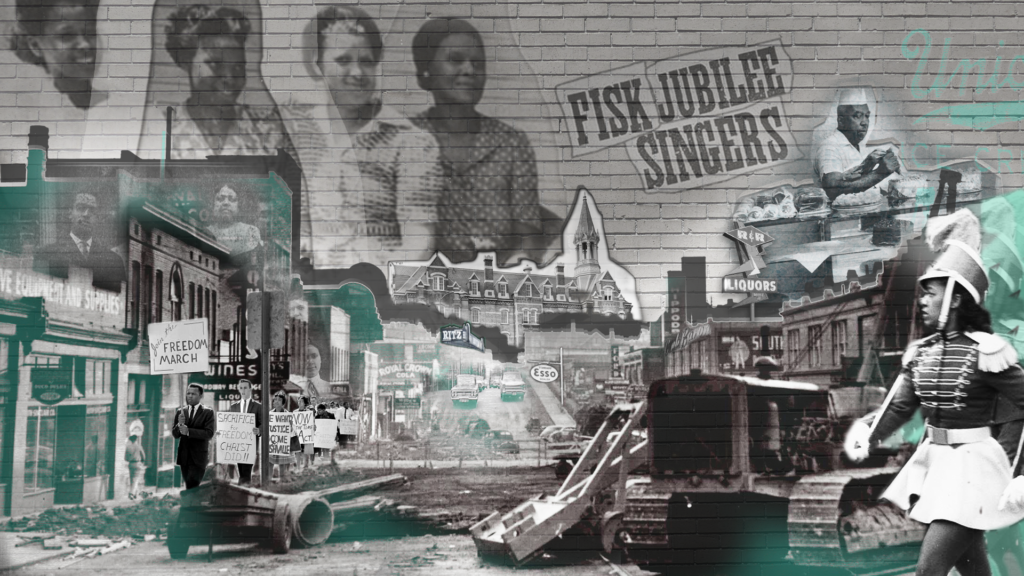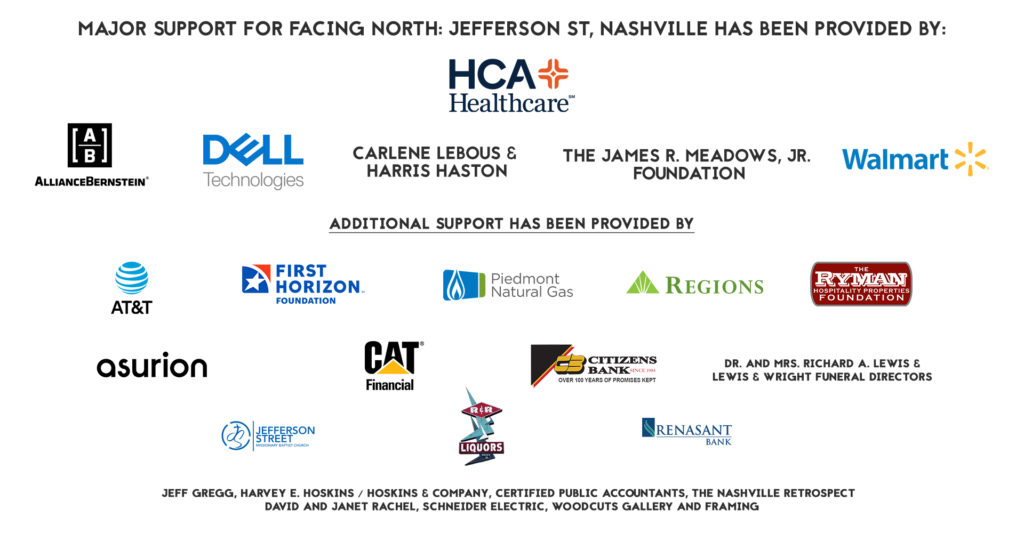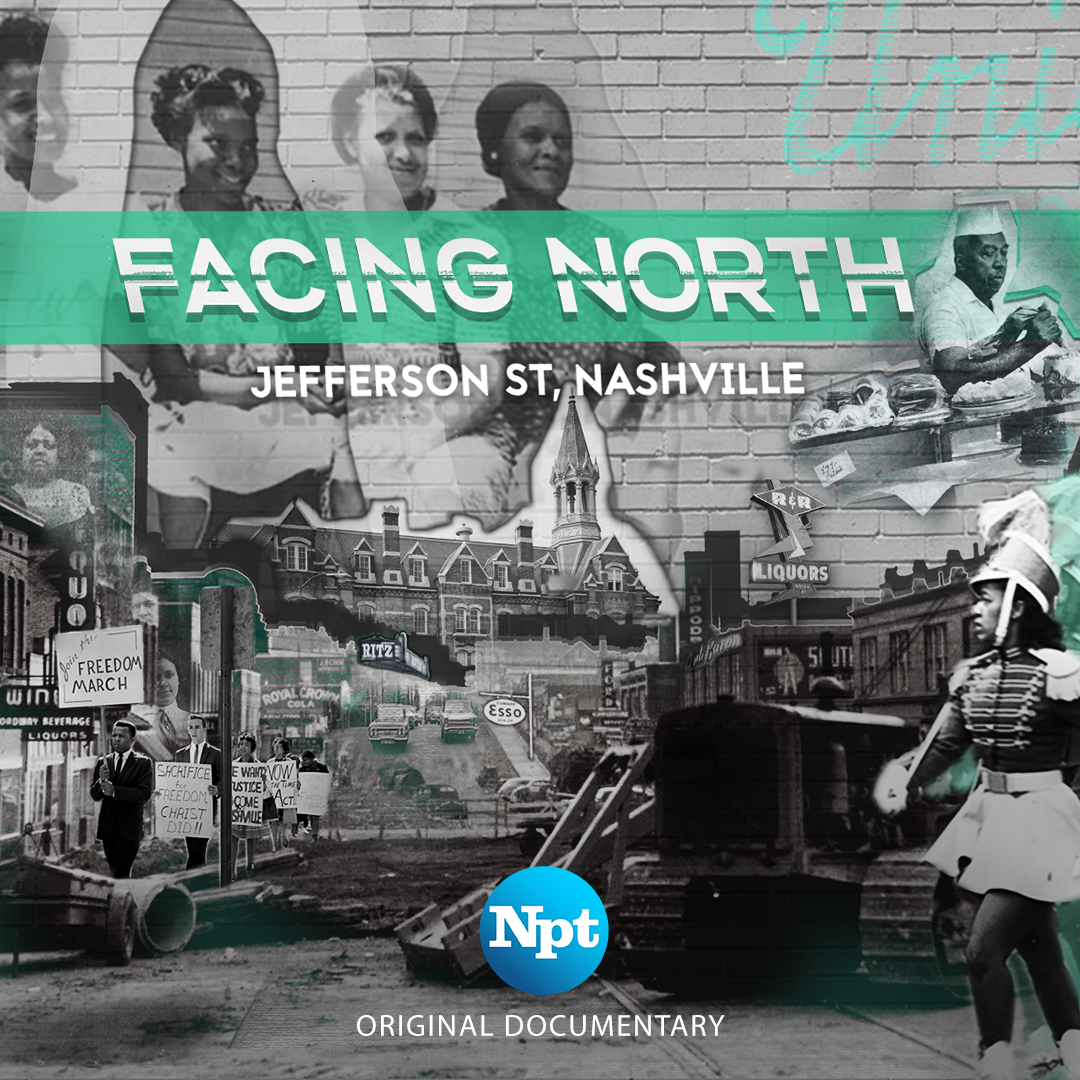
Jefferson Street is a fabled area of Nashville, known as the cultural center of the city’s African American community. Once a haven for former slaves, it is home to three iconic HBCUs – Fisk University, Meharry Medical College and Tennessee State University – that educated doctors, lawyers and civic leaders. Students from these institutions led peaceful and effective civil rights protests in the 1960s. NPT’s Facing North: Jefferson Street, Nashville premieres on-air and online Monday, Sept. 21, at 8 p.m. The story of the North Nashville community is told by longtime residents and historians, as well as through archival and family photographs and film clips.
“Jefferson Street represented a cross section of what the American dream would have looked like for many African Americans coming out of slavery,” Tennessee State University’s Dr. Learotha Williams Jr. says in Facing North: Jefferson Street, Nashville.
This documentary conveys what Jefferson Street life was like over the decades, including during segregation, highlighting the importance of home and business ownership, and spiritual life as the home of some of Nashville’s oldest Black churches. Jefferson Street’s thriving music scene of the 1940s through 1960s is also covered. Like many African American centers, this one was forever changed by interstate construction and urban renewal programs and now struggles to balance rejuvenation with gentrification amid new economic pressures.
Facing North: Jefferson Street, Nashville was produced by NPT’s LaTonya Turner, whose previous work includes NPT Reports: Whose Music?, Aging Matters documentaries and The Early Black Press: Tennessee Voices Lifted.
“I consider this production to be a social history of the Jefferson Street community,” Turner said. “ It was really important to me for the story to be told authentically and organically through those who know it best.”
TSU alumna Kayla Todd served as production assistant on Facing North: Jefferson Street, Nashville.
The documentary re-airs Friday, Sept. 25, at 7 p.m. on NPT; and Wednesday, Sept. 23, at 8 a.m.; Thursday, Sept. 24, at 1 p.m.; and Friday, Oct. 2, at 11 p.m. on NPT2. The documentary will be available for streaming at video.wnpt.org/show/facing-north-jefferson-street-nashville.
In Facing North: Jefferson Street, Nashville attorney and former Metro councilmember Ed Kindall recalls growing up along a vibrant Jefferson Street corridor. “You felt more welcomed here, because downtown, as you well know, some places you couldn’t sit down and eat,” Kindall says.
Sandra Harris reminisces about having an Easter portrait taken at a neighborhood studio and attending high school dances held in Meharry’s cafeteria. Now vice dean and associate professor at Meharry Medical College School of Dentistry, Dr. Harris also shares family history – her great-grandfather, Dr. Richard Harris, was the first Black trustee of Fisk University.
Lorenzo Washington did not want Jefferson Street’s musical history and significance to be lost, so he founded the Jefferson Street Sound Museum. (Washington and the museum are also featured in a Tennessee Crossroads segment airing Thursday, Sept. 17, at 7 p.m. and Sunday, Sept. 20, at 10 a.m.)
A number of historical and iconic figures are referenced in Facing North: Jefferson Street, Nashville in relation to their appearances or work on Jefferson Street. Among them are Frederick Douglass; suffragist J. Frankie Pierce; entertainers Ray Charles and Jimi Hendrix; boxers Joe Louis and Muhammad Ali; activist Stokely Carmichael; Negro League baseball teams; and the original Fisk Jubilee Singers.
“Jefferson Street is one of the examples of key African-American commercial streets where the history has been neglected, or lost, stolen, or strayed, “ retired TSU professor Dr. Bobby Lovett says in the documentary.
Other historians appearing in the documentary are: Crystal deGregory, Ph.D., research fellow, Center for Historic Preservation, MTSU; James C. Fraser, Ph.D., visiting professor and scholar-in-residence at the University of Minnesota’s Center for Urban and Regional Affairs; Brigette Jones, Curator of Social History, Tennessee State Museum; and Carroll Van West, Ph.D., Tennessee State Historian and Director of Center for Historic Preservation, MTSU.
Facing North: Jefferson Street, Nashville is not merely a historical account of Jefferson Street, it is also a look at the evolving community as residents confront challenge after challenge. From the construction of I-40, recent gentrification and in this year alone – natural destruction and the economic fallout of the COVID-19 pandemic. In fact, the documentary begins with Antoine Gaines surveying the damage to his house after the March 2020 tornadoes.
After the tornadoes, Elisheba Israel Mrozik helped set up a station to provide food and other assistance. “We just wanted to make sure that the people over here on this side of town are going to get what they need from the community, because they’ve been systematically neglected for so long in this area,” she says in Facing North: Jefferson Street, Nashville. Mrozik is the owner of One Drop Ink Tattoo, a newcomer to the area, she is determined to help preserve the community’s history and to provide support services for residents.
“None of us anticipated the March tornado or the coronavirus when this project began. But those events wound up being so reflective of the story – how outside forces, natural and manmade, have repeatedly disrupted a once stable, vibrant and culturally rich community,” Turner said.
“I know development is going to come,” says Aleathea Harris Little, the fourth generation of her family to live on Jefferson Street, in a house that belonged to her great-grandmother. “But I don’t think it should eradicate our history.


1 Comment
There is no support from Councilmen in this district my father built a shop on 943 28th am keeping in the family